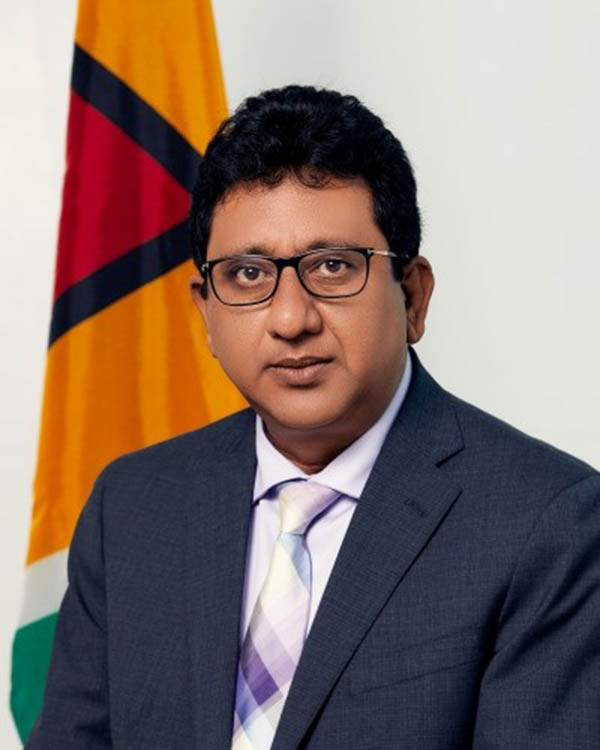The Full Court on Friday last affirmed a previous ruling that Minister with responsibility for Finance, Dr. Ashni Singh, could have freely disbursed funds to constitutional agencies, in keeping with estimates in the Appropriation Act 2021 (Act 5 of 2021).
This is according to release from the Chambers of Attorney General (AG), Anil Nandlall SC.
Opposition Member of Parliament (MP) Ganesh Mahipaul had brought an action against the AG, Singh, the Judicial Service Commission (JSC) and other constitutional agencies; seeking a declaration that the agencies be allowed to function independently, impartially and free of the exercise of any control by the Executive or any other entity.

He also wanted the court to declare that the inclusion of the constitutional agencies as budget agencies in the Schedule to and under the Fiscal Management and Accountability Act (FMAA) was inconsistent with the independence assured to those constitutional agencies.
Mahipaul had wanted the entire FMAA to be declared void.
Justice Nareshwar Harnanan back in March of this year, however, had ruled that Singh had properly made the disbursement of the funds.
Mahipaul would later file an appeal before the Full Court.
The release from the AG’s Chambers said that presiding Judges Brassington Reynolds and Sandil Kissoon dismissed the appeal and denied a number of conservatory orders which were being sought.
According to the press release, the Court threw out the appeal in view of the fact that the issues raised had long been overtaken by events.
Mahipaul by whom the action was brought along with a number of other persons, have all been ordered to pay court costs in the sum of $250,000.
Mahipaul had argued among other things that the power and exercise of budgetary and fiscal control over budget agencies under the Act by government ministers in general, and the finance minister in particular—all being members of the Executive, is inconsistent with and contrary to the Constitution.
Such powers he contended reside exclusively in the Legislature/the National Assembly.
Through his battery of attorneys led by Senior Counsel Roysdale Forde, the Applicant sought conservatory orders to restrain Singh, from disbursing funds to the agencies.
Nandlall had, however, argued that the orders sought by Mahipaul had been overtaken due to the fact that the Appropriation Act was passed the day before Justice Harnanan’s March 5th ruling, and the finance minister had already begun the process of effecting disbursements during Parliamentary sittings the week prior, where the 2021 National Budget was debated and also subsequently passed—all ahead of the court hearing back in March.
As a result, Nandlall had further submitted to Justice Harnanan that the issues at that point raised in Mahipaul’s application were merely academic and not to be entertained.
The AG reasoned that what the applicant was in effect asking the court to do, was suspend the Appropriation Act from taking effect though it had already been assented to by the President a day earlier.
Nandlall’s contention was that the Appropriation Act was issued by virtue of the authority of Article 218 of the Constitution, upon the approval of the National Assembly of the Estimates and Expenditures; and it therefore constitutionally compels the minister to disburse.
Justice Harnanan had noted in his ruling that the Applicant’s request for the conservatory order had been overtaken by events, and was therefore spent. He further said that Mahipaul had failed to demonstrate how the public interest was negatively affected by the disbursement and how the refusal of the orders would have rendered his application nugatory.
Mahipaul’s contention had been that the expenditure of each of the agencies ought to be financed as a direct charge on the Consolidated Fund, determined as a lump sum by way of an annual subvention and is disbursable out of the said Fund without an Appropriation Act and cannot therefore form part of the estimates to be included in any Appropriation Bill and or Act, as it would be unconstitutional. He had contended, too, that the Amendments enacted in the FMAA were in breach of the doctrine of the Separation of Powers, and therefore unconstitutional, as it renders Parliament and the Judiciary dependent on the Executive for funding.
He had submitted that the passage of the FMAA by the National Assembly which was assented to by former President David Granger on August 5th, 2015 outlined a procedure for the request of constitutional agencies for funding, to be considered directly by and only by the National Assembly instead of the Executive micro managing the activities of those agencies.
According to the Applicant, the FMAA established for the first time, a legislative foundation for the independence of the constitutional agencies of Guyana and gave them complete control of their finances.
He had said that the House then passed Constitutional Amendment Act, No. 1 of 2016 which was assented to by Granger on the January 11th, 2016, in which the Parliament Office was added as an entity listed among the constitutional agencies.
Mahipaul contended that with the passage of the Fiscal Management and Accountability Amendment Bill of 2021 repealing Section 80B (1) to (4) of the FMAA which was amended by the Fiscal Management and Accountability (Amendment) Act of 2015 to now include the constitutional agencies they are once again relegated to mere budget agencies which are “subject to the whims and fancies of the Executive.”
Apart from Mahipaul the other applicants in the action were Coretta Mc Donald, General Secretary of the Guyana Teachers Union; Dawn Gardener, First Vice President of the Guyana Public Service Union; Michael Sommersaul, Chairman of the Public Service Commission; Clinton Conway, Member of the Police Service Commission, the Police Service Commission and Allan Munroe, Chairman of the Teaching Service Commission.






